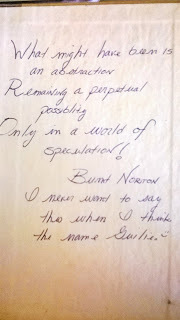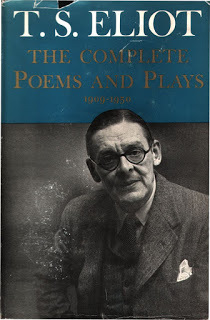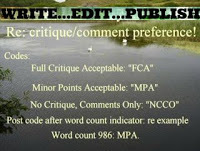Spectacular Settings! (#WEP)

Hosted by wonder-women Denise Covey and Yolanda Renee, the WEP (Write - Edit - Publish) Spectacular Settings hop is all about the power of place -- and the part it plays (can/should play) in writing.
Got a spectacular setting from a favorite book? Join the hop (it runs from the 19th to the 26th) and share! (More info here.)
The setting I'm sharing here is not from fiction but from poetry. And not just any poet, either. If you've followed this blog for a while, you might know I'm a huge fan of T.S. Eliot. A couple of months ago a long-time friend -- one of those people from the past that sometimes pop up into the present, usually bearing extraordinary gifts -- got together a small group of poetry enthusiasts for a reading circle on Skype (we're scattered all over, geographically), and the first piece we read was Eliot's Four Quartets .
It's a piece I know well, maybe more than well -- it was none other than this old friend who introduced me to Eliot some 20 years ago, and the Eliot collection I own is one he gave to me back then... twenty years almost to the day we began reading. Several bits from Four Quartets have, in these two decades, gained special significance. For instance,
 The inside flap at the back of my
The inside flap at the back of myT.S. Eliot volume. Debate still
rages on whether the book itself or
the inscriptions (or the experience!)
were the greater
gift.
What might have been is an abstraction
Remaining a perpetual possibility
Only in a world of speculation.
Yes. T.S. Eliot is special to me.
The bit I'm sharing today isn't from Burnt Norton but from the first verse of East Coker (the second Quartet):
In my beginning is my end. Now the light falls
Across the open field, leaving the deep lane
Shuttered with branches, dark in the afternoon,
Where you lean against a bank while a van passes,
And the deep lane insists on the direction
Into the village, in the electric heat
Hypnotised. In a warm haze the sultry light
Is absorbed, not refracted, by grey stone.
The dahlias sleep in the empty silence.
Wait for the early owl.
Let that sink in for a second. Read it again if you want. Read it aloud, yes, and let the rhythm work on you, on your imagination.
Do you see it? The lane in chiaroscuro, the way the afternoon light dapples everything, the shadows the branches cast, so regular, so thin -- yes, like window shutters against the glare of the sun. Can you hear the mild rumble of the passing van? (I imagine it white, for some reason.) Can you see the field stretching out, out there in the light while you are in the speckled shadows? Can you feel the warmth out there? Can you feel the coolness of the darkness where you -- as you are commanded to -- wait?
 Eliot weaves magic into pretty much every line he writes, and I think the secret -- one of them, anyway -- is his unexpected choice of words. He could've gone on and on with indisputably beautiful phrasing about the light, about the field, about the van... maybe even deviated into describing a view of the town just around a bend in the lane.
Eliot weaves magic into pretty much every line he writes, and I think the secret -- one of them, anyway -- is his unexpected choice of words. He could've gone on and on with indisputably beautiful phrasing about the light, about the field, about the van... maybe even deviated into describing a view of the town just around a bend in the lane. Instead, he eschews straight-forward descriptive words, which might have painted a pretty picture (and nothing more), in favor of two things: first, he puts us right there in the scene -- we lean against a bank while a van passes -- and he gives the lane not just character (did you catch the repetition of deep lane?) but also action; even though the lane is, presumably, inanimate and non-sentient, it insists on the direction / Into the village, seemingly hypnotised by it.
Perhaps more importantly, these two things build up to create not just a setting but an ambiance: the shuttered lane, the fact that the light is absorbed, not refracted, by grey stone, and the sleeping dahlias in the empty silence.
I'm there. In that lane. (Wherever it may be.) I can see it, breathe it, feel it on my skin.
To me, this is an extraordinary lesson in the potential of setting: its power is multiplied infinitely when instead of writing about place we write about ambiance.
Do I set too high a bar? Maybe. I believe that the farther you aim, the farther you'll reach, even if the throw keeps falling short. But that's for you, not me, to judge. Here's a favorite piece of setting (ambiance? dare I hope?) from my book THE MIRACLE OF SMALL THINGS (Truth Serum Press, Aug 2015). It's a tiny piece; the opening paragraph, in fact:
There's no stillness like the stillness of Curaçao on New Year's Day. Pointless tropical sun on deserted asphalt, every business shuttered, everything forlorn. Not even trash stirs: the wind is on furlough too. There's also no New Year's Eve like Curaçao's, which explains the stillness. But to Luis Villalobos, this desolate emptiness feels like the cold shoulder of the world.
Luis has just ruined his life.
Writing about this adopted island home of mine was challenging in ways I didn't expect. So few people have heard of Curaçao that it's like writing about a mystical Shangri-La -- and maybe it would've been easier to stick to Caribbean sun-sea-sand stereotypes, but... Well, see, I've fallen in love with this place. And I've fallen in love precisely because it isn't any kind of stereotype. There's so, so much beauty here -- but of the hidden, slippery kind, "the kind that the traveler seeking glamour or sycophantic perfection will never be able to see." And I wanted to bring that beauty to the kind of person who can not just see it but be smitten by it.
Did I succeed? Is there any such thing as success in this writing thing we do? Another gorgeous, if a tad neurotical, Eliot quote (also from East Coker but from verse V, the last verse) to close:
[...] and every attempt
Is a wholly new start, and a different kind of failure
Because one has only learnt to get the better of words
For the thing one no longer has to say, or the way in which
One is no longer disposed to say it.
Yes, I realize the book is published and critiques won't lead to an improvement on this particular bit, but they most definitely WILL lead to my growth as a writer (and as a person... critiques do that, you know). So, please. Any thoughts you have on this briefest of offerings -- construction, word choices, what it made you imagine / feel / think of -- and how it could've been improved to make you imagine / feel / think of whatever better... All of it and more is not just welcome but much appreciated.
 Critique preference: FCA
Critique preference: FCAFor the life of me, I couldn't figure out how to add the Linky list to share the other Spectacular Settings participants, so if you're in the mood for more place and atmosphere extravaganza, please visit the Write - Edit - Publish website for the list. And thank you, so much, for the visit!
Published on August 18, 2015 23:00
No comments have been added yet.



